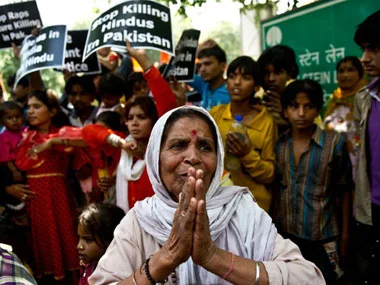
While Pakistan's Sindh province boasts a rich Hindu history and tradition, it stands out as an anomaly in the predominantly Muslim country. Discrimination, however, is on the rise through the landscape of Pakistan, and Sindh in particular, retains a Hindu imprint.
Historically, Pakistan was home to a thriving Hindu community dating back to the ancient Indus Valley Civilisation. However, events such as the 1947 partition led to mass violence, forcing millions of Hindus and Sikhs to flee to India. The Hindu population in West Pakistan declined from 15% at the time of Partition to approximately 2% in 1951. Today, Hindus comprise only 1.6%, and major cities like Lahore have seen a drastic decline in their Hindu/Sikh communities.
Extremism and sectarian violence are on the rise in Pakistan, fueled by terrorist groups promoting Islamic rule and violent jihad. These groups operate freely, influencing government policies and education. Islamic student organizations and legislation have made Quranic studies mandatory in universities and schools, fostering an environment of intolerance. Educational institutions, including madrassas, teach hatred towards Hindus and Christians, contributing to a regressive and extremist atmosphere. Young children are even influenced to express violent sentiments.
As children studying in Pakistan, we were consistently taught to harbor negative sentiments against Hindus, fostering unwarranted hatred without any legitimate justification. Making comments such as "go back to your country" became normalized, overlooking the fact that one's religion does not dictate their nationality. Being Hindu does not negate someone's Pakistani identity.
Throughout our school years, a uniform narrative prevailed, painting Hindus in a negative light, ingraining a prejudiced aversion towards them.
Secondly, abduction and forced conversion of Hindu girls in Pakistan have reached alarming levels, with an estimated 1000 Hindu and Christian girls being forcibly converted to Islam annually. These girls are often subjected to heinous acts such as forced marriages to much older men, sexual assault, human trafficking, and forced prostitution. Between 2004 and 2018, the Sindh province alone reported 7430 cases of kidnapped Hindu girls, indicating a pervasive issue.

It’s important to note that Pakistan's legal system lacks adequate safeguards for underage minority girls, leaving them vulnerable to abduction, forced conversion, and marriage.
This reminds me of this one case, involving a Hindu lady employed at a salon I would go to in Karachi. During a conversation where I complimented her name, she nervously disclosed that it wasn't her real name. When I inquired about her actual name, she hesitated, expressing fear that revealing her Hindu identity could place her in jeopardy.
This anecdote underscores the broader challenges faced by Hindu women in Pakistan. The societal expectation for them to hide their religious identity is unjust, prompting the question: Why should they be compelled to conceal their identity in their own country?
The lack of legal safeguards not only leaves underage minority girls vulnerable but also perpetuates an environment where individuals like the Hindu lady at the salon feel the need to hide their true selves for fear of potential harm. This situation raises fundamental concerns about the principles of equality, freedom, and security within a society that should ideally embrace diversity and protect the rights of all its citizens.